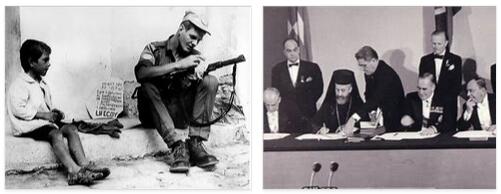Cyprus History: From Its Origins to Independence
The island of Cyprus represented from the earliest times an important economic link between the Asian world, towards which it naturally gravitated, and the Greek West. Active center already in the Eneolithic age, during the second millennium it was politically attracted first by Assyria and then by Egypt. Contacts with the West intensified especially in the Mycenaean age. In the classical era it did not have a particularly noteworthy history, except for the adhesion of some of its poleis to the Ionian revolt against Persia at the beginning of the century. It goes. C. and the period of the government of Evagora in the sec. IV. Vassalla on several occasions of Persia, from whose yoke she was definitively removed from Alexander the Great(333 BC), in the Hellenistic period belonged to the Lagides of Egypt. Conquered by the Romans, it became a province in 58 BC. C. and was united with Cilicia. In imperial times, Cyprus was part of the Eastern Empire. It conquered by the Arabs in 649, repeatedly conquered by Byzantium, in 1185, under the guidance of Isaac II Angelus, rebelled against Emperor Andronikos I. Subtracted from the Byzantine dominion by Richard the Lionheart during the III Crusade (1191), it was ceded by him to Guido di Lusignano, king of Jerusalem (1192), and formally elevated to kingdom in 1195 by the emperor Henry VI in favor of Amalric II (1194-1205), brother and successor of Guido. Crowned in 1197, Amalric transplanted on the island, of Greek population and culture, a robust nucleus of French elements, mostly coming from the Kingdom of Jerusalem, which constituted a dominant aristocracy of knights and prelates, introduced the feudal order and it gave development to the Latin Church at the expense of the Greek one. During the younger age of Henry I (1217-53), while the emperor Frederick II waged a long and useless struggle to take over the kingdom (1228-33), the factions whose struggle was to mark almost three-century history strengthened in Cyprus of the kingdom. The initiatives of a brave king, Hugh III of Lusignano-Antiochia (1267-84), who was also elected king of Jerusalem (1269), were compromised: the reign of Henry II (1285-1324), harassed by his brothers and powerless to help St. John of Acre, the last bastion of the Kingdom of Jerusalem, was tormented by the rivalry between the various families.
According to homeagerly, a sudden and ephemeral awakening took place under Ugo IV (1324-59), who was able to gather the Cypriot forces to undertake, with the Pope, the Venetians and the Knights of Rhodes, a real crusade against the Turks which failed due to lack of help from part of the Christian States of Europe. This fruitless effort severely weakened the kingdom: Peter II (1369-82) was forced to surrender Famagusta (1373), the most important of its ports, to the Genoese. To the Genoese dominance, accentuated under James I (1385-98) and Janus (1398-1432), a Turkish aggression was added, following which Nicosia, the capital, was sacked (1426) and the king had to recognize himself as a vassal of the sultan of Egypt, while the rural population, exasperated by so many disasters, rose up with unprecedented violence. John II (1432-58), who to appease the Greek element had moved closer to Byzantium, left the kingdom to his daughter Carlotta, wife of Lodovico di Savoia, excluding his natural son Giacomo. The latter, usurped the throne from his sister (1460), reigned until 1473, took Famagusta from the Genoese and, marrying the Venetian Caterina Cornaro, approached their rivals, the Venetians: he kept the factions in balance, tempered relations between Latins, Greeks and Turks and loosened the bonds of vassalage with the sultan of Egypt. Dead James II and her son James III (1474), Catherine found herself alone to face the parties, who wanted to hand over the kingdom to the Aragonese of Naples or to the Venetians, and in 1489 she was forced (with all honors) to abdicate in favor of Republic of Venice, which retained its dominion on the island until the Turkish occupation of 1571. After three centuries of Turkish domination, which had excluded the island from trade lines between Europe and the Levant, in the century. XIX Cyprus acquired new importance as a strategic point, especially after the opening of the Suez Canal. Treaty of Sèvres, 1920, and the Peace of Lausanne, 1923, confirmed the annexation). With the statute of 1925 Cyprus became a British colony, governed by a governor.
After the Second World War, during which it had been powerfully fortified, a new period of instability opened up for the island linked to the irredentist movement that had been developing among the Greek population since 1931. In the early postwar years, especially with the election of Makarios III as ethnarch and national leader of the Greek Cypriots (1950), the crisis acquired international dimensions. A plebiscite organized (1950) by Makarios opted for union with Greece (enosis) and in 1951 a plan was drawn up in Athens, sharply rejected by the British foreign minister Eden, which in exchange for the enosis provided for the transfer to Great Britain of the Cypriot military bases and other bases in Greece. In 1954-55 the crisis degenerated into the armed revolt of the EOKA, a nationalist organization headed by Colonel Grivas; Greece resorted to the UN and Great Britain strengthened the bases on the island, at the same time inviting Turkey to formally take an interest in the crisis. The deportation of Makarios from the island caused the first negotiations between the ethnarch and the British governor Harding to fail (March 1956). The intensification of the guerrilla warfare against the British and of the clashes between the Greeks and the Turks finally led Greece and Turkey to the negotiations that ended with the Zurich accords (February 1959). They envisaged the creation of the independent Republic of Cyprus, with Greek president, Turkish vice-president and a pre-established division of political and administrative offices between Greeks and Turks. Great Britain, Greece and Turkey were guarantors of the new Cypriot status and Great Britain was granted “sovereign rights” on some grounds; to Greece and Turkey the right of garrison on the island. Makarios was elected president in December 1959; Cyprus became independent in August 1960 and the forecasts on the non-functioning of the Constitution were almost immediately confirmed; the Greeks became more and more unitarians and centralizers, while the Turks opted for an accentuated federalism and ultimately for the partition of the island.



